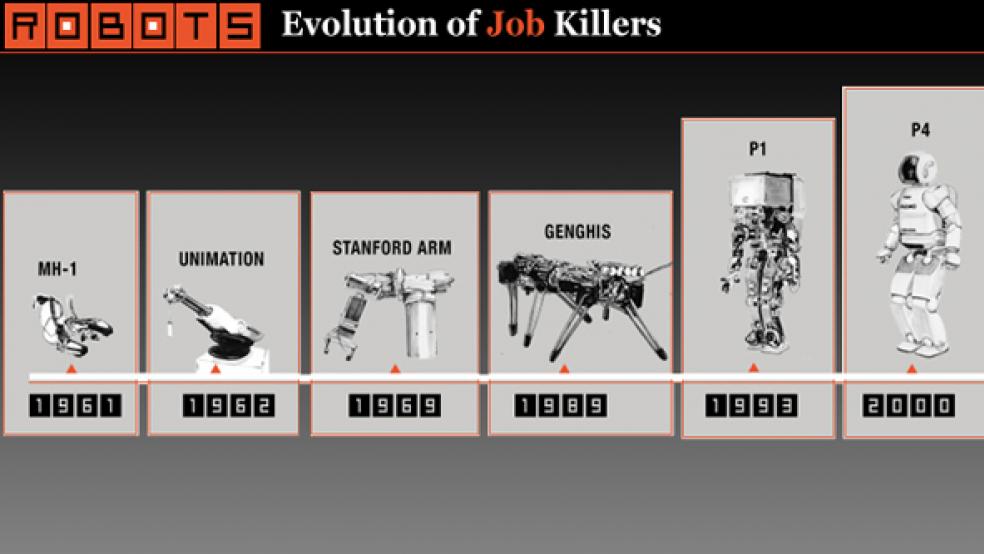Without a doubt, America has reached the age of the robot. In the past few years, hundreds of robotic breakthroughs have made headlines: unmanned planes, bots in space, dancing robots, self-driving cars, a Jeopardy-playing robot. Now, the President wants even more.
Last month Obama announced the National Robotic Initiative, a commitment to invest $70 million in next-generation robotics that will allow “factory works, health care providers, soldiers, surgeons and astronauts to carry out hard-to-do tasks.” And they have already done some pretty heavy lifting: It took a robot to finally cap the BP well that spilled millions of crude into the Gulf. And only a robot could enter Japan’s crippled Fukushima Daiichi nuclear power plant to check radiation levels.
As useful and exciting as these new generation machines are, Obama might not see the hole robots are digging for us: They’re rapidly evolving to take over hundreds of thousands of human jobs, according to Martin Ford, author of The Lights In the Tunnel: Automation, Accelerating Technology and the Economy of the Future. Ford believes a massive job crisis is inevitable even before we have time to catch our breath and recover from the current economic crisis. In an interview with The Fiscal Times, Ford discusses why no one’s job is safe, why jobs lost in the recession are never coming back, and what, if anything, we can do about the robot revolution.
The Fiscal Times (TFT): You say that robots are poised to take over the low-wage jobs of cashiers, fast-food workers , office assistants, and even some high-wage jobs like radiologists.
Martin Ford (MF): Machines and computers are getting better at an accelerated rate, and I think within maybe 5 to 10 years things are going to get to the level where machines begin to surpass the ability of most people to do routine work. I base this partly on my belief that most of the work out there in the economy is routine in nature. There aren’t that many people that are paid to think creative thoughts.
TFT: But haven’t people been talking about automation for years? Why hasn’t it happened yet?
MF: The technology just hasn’t been there. It’s not about building the robot arm, it’s about controlling the robot arm; it’s about how to make the machine think and we’re just getting to that point now. It’s the first time we’ve had this level of technology that allows machines to solve problems on their own, to interact with their environment, to analyze visual imagines, and to manipulate their environment based on that.
TFT: The common argument is that technology advances society and creates jobs. Are you saying it no longer will?
MF: So far, advances in technology have allowed us to become more prosperous and push economic growth, but the reason it’s made workers more productive is because machines and computers have been tools. At some point, we’re going to get to where machines stop being tools to be used by workers and they become workers in their own right. Without an income, people can’t participate in the economy. Alan Blinder, an economist at Princeton, has been talking about how productivity increases in the economy are no longer transmitted to workers in the form of wages. Nowadays when we see productivity increases, [the financial benefit] ends up at the top; it goes to the CEO, to the shareholders, but workers don’t get any of it. It’s hard to have more prosperity under this system because as workers start to lose jobs and see lower wages, they can’t participate in the economy as consumers.
TFT: How might you re-wire the economy to adjust to this?
MF: If it’s at a point where there aren’t enough jobs or if those jobs don’t provide enough income for people to cover their basic expenses, I think you have to have some form of progressive taxation and redistribution. Right now, we’re moving in the opposite direction, we’re talking about austerity, it looks like we’re going to destroy the few safety nets that we have for working people, and I honestly think it’s a disastrous move. The current situation we’re in could really drag on and while we’re waiting for the job market to recover, these technologies are going to continue to accelerate and it’ll be more difficult to get these jobs back. It will be like running up the down escalator. Economist David Autor has come to the conclusion that the middle-range jobs that used to support a solid middle-class lifestyle are pretty much gone.
TFT: Which middle-range jobs?
MF: Secretaries, administrative assistants, mid-range office jobs. If you’re anyone other than the CEO you no longer have a secretary, you have a computer. That type of job has already been eliminated. Jobs that involve sitting at a computer are more susceptible to automation because they can be automated with software, you don’t need robots. There is now software that automates going through reams of documents and figuring out which ones are important for a court case, something that used to be for lawyers and paralegals. The first litmus test is ‘Is it a boring job? Is it repetitive and tedious and boring even though you need lots of training?’ If so, it’s probably going to be one of the first jobs to be hit.
What you saw with IBM’s Watson was very important. He was given thousands of Jeopardy questions and eventually got to championship level. He was able to learn by doing and get better and I think you’re going to see machine-learning applied in lots of areas, in high-end jobs and low-end jobs. When a machine gets to a certain level of expertise, everything it knows resides in its memory and can be copied. If an employer sends one robot employee to a training course and they master the information, you can clone them and send them out everywhere to do to the work, which could potentially be pretty disruptive.
TFT: How can job creation happen? Do you think we’ll ever get back to low unemployment?
MF: I hope so, but technology is not going to stop getting better. There are certain jobs that are going to be hard to automate, like being a plumber, electrician, or a mechanic, but new technology-based jobs don’t have a long history. They can be replaced by something else or eliminated entirely. Data-entry clerks and IT jobs are getting automated and outsourced. The idea that the jobs of the future will be in computers is becoming less true. Increasingly you’ll see a winner-takes-all phenomenon where there’s a demand for top people, those who graduate from MIT or something, but broad-based employment is getting a lot tougher. It’s hard to know where the job creation is going to come from.
TFT: What robot has affected the most jobs so far?
MF: The first enormous impact was when agriculture mechanized -- millions and millions of jobs were lost. Most of those people shifted to another sector, primarily manufacturing, and economists will argue that when you automate one place, another sector will arise, and that’s historically true, but it’s not easy: millions of people suffer and lose income. After manufacturing, we became a service economy. Now the service sector is clearly going to be automated, but what sector will rise up next? People talk about health care but that’s really just a section of the service sector. Certain groups like nurses and doctors will be fairly well protected but going forward even those areas are at risk. A lot of what doctors can do in terms of diagnosis can be done by automation.
Look at the companies you can think of that have come to prominence in the last 10 years: Google, Facebook, Netflix, twitter – they’re all technology-intensive companies that hire people who are highly skilled, but don’t create jobs for average people.
There are a few labor-intensive parts of the economy left – big retailers, restaurants, hotels –but what happens when fast-food begins to automate? What happens when companies like Wal-Mart begin to use robots to stock shelves? Then that labor-intensive part of the economy begins to look more like Google – it becomes more technology intensive. It’s hard to imagine in the future they’ll be some new industry that will have to hire lots of average people. Maybe there could be hope in green energy like installing solar panels, but only for a limited amount of time. Infrastructure is not a self-sustaining job. In terms of new industries, they’re all going to be technology intensive, not industries that employ lots of people. That’s going to be a real problem and I don’t see how we get around it.
TFT: But don’t some jobs need a human touch? Such as a salesperson?
MF: In certain areas, yes. I actually always think there will always be sales jobs. A social worker, for one, requires human-type interaction, but the question is, can we put everyone in those jobs? Are there enough of those jobs for everyone? There aren’t. If you figure 60 percent of the jobs out there are routine jobs where people do the same kind of things subject to automation, and you have a minority of jobs that are uniquely human than there is going to be a secondary impact. In the government sector, the social worker is likely to be gone because the government can’t afford the social worker. We see that in schools, counselors are getting cut because they can’t afford them. They can’t be automated, but they’re getting cut because of what’s happening on the revenue side.
TFT: How about the risks involved with automation? Powerful computers and high-frequency trading on Wall St. is one reason among many that could prompt a market crisis. Will there be more risks like that in the future?
MF: It’s possible -- you’ll see more trading get automated and happening at these incomprehensible rates and no one knows what’s going on; it’s a bunch of computers autonomously doing things. Last year, the market had that flash crash and it took months to really analyze it and I don’t know if they can agree on what happened, but it will create a danger in markets.
TFT: So what do we do about it?
MF: If we do nothing, that would result in social instability; you’ll have people living in tent cities, losing their homes, even worse than now. That’s the path to disaster. What I suggested in the book is [to] get the government involved in providing an income with what I consider to be a market-based approach because you’re doing taxation and redistribution, you’re giving people some kind of an income but they’re still participating in the market as consumers. There isn’t a solution where everything will be OK – but we have to do something. I want lots of people, including economists, to be thinking more about this issue because right now they’re very dismissive of it and they don’t see it as a problem and I think it deserves more attention. If in fact so many of the ideas that I’m suggesting turn out to be correct and we run into a problem, at least people will have thought about it.
For more on robots from The Fiscal Times:
Could Fast Food Robots Steal McJobs?
Here Come the Robots…And There Go the Jobs?
Bionic Eyes That Can Help the Blind See





